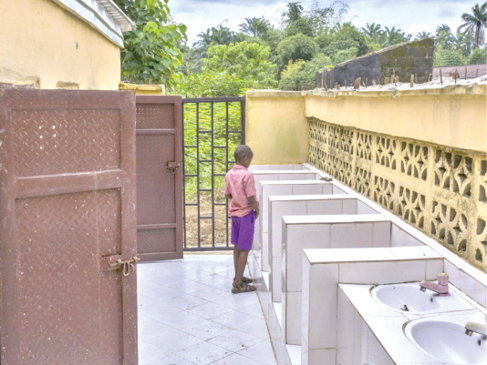Nigeria currently has the highest number of people – about 90 million – living in extreme poverty in the world, representing nearly half the population.
While there are challenges in all sectors, data coming from the water, sanitation, and hygiene (WASH) sector are particularly alarming.
Findings from the 2018 WASH National Outcome Routine Mapping, a survey conducted by the Nigerian Ministry of Water Resources and National Bureau of Statistics, with support from UNICEF, revealed that only 11 percent of the population, 7 percent of schools and 5 percent of health facilities have access to basic WASH services.
Nigeria also ranks second in the world when it comes to open defecation (very closely behind India, and set to overtake it very soon), with 24 percent of the population – 47 million people – practicing open defecation.
WASH survey results also show that access to WASH services is unfairly biased against poor families. The poorest households are up to 10 times less likely to access basic WASH services than their wealthiest counterparts.
Families that have poor access to safe water and sanitation services are exposed to debilitating and life-threatening WASH-related diseases. Children from these families experience nutritional deficiencies when they fall sick due to frequent episodes of diarrhoea. The ripple effect is poor school attendance and lack of learning opportunities.
Sometimes the recovery process takes a more negative turn. It is estimated that more than 60,000 Nigerian children under five years die each year from diseases caused by poor WASH services.
To achieve the SDG target of universal basic sanitation by 2030, Nigeria needs to add 3 million latrines per year between 2019 and 2030. Nigeria’s current delivery of improved latrines is only about 160,000 per year.
In response to this challenge, the government, with UNICEF’s strong support, has created the Clean Nigeria Campaign Programme, a national movement to end open defecation by 2025.
Experience reveals that sanitation marketing and financing is a viable tool for helping to achieve the goal of ending open defecation in Nigeria.
Findings from research commissioned by UNICEF reveal that Nigerians in rural communities want improved sanitation but lack the resources for it.
The sanitation marketing and financing approach provides affordable toilet options to the poor, including giving them access to soft loans to build toilets. It also strengthens sanitation supply chains and connects entrepreneurs to communities and households desiring improved toilets.
UNICEF has trained and empowered toilet business owners across communities, which have been instrumental in constructing more than 13,000 toilets for households in rural areas.
“Sanitation marketing has given me a job. Before, I was a hunter moving from one bush to another searching for meat. But now, I keep myself busy identifying households that need to construct smart toilets and making an income at the same time,” said Rabe Chinkis, a toilet business owner.
Community credit and savings groups, locally called Adashe, are designed to support members with soft credit to build toilets. Poor households access loans to construct toilets outside the conventional loan scheme, which most of them are not qualified to join, due to lack of collateral.
More than 1,600 Adashes have been set up across the country, and more than 6,000 improved toilets have been built or upgraded.
Through the sanitation marketing and finance approach, the private sector is also supporting poor households to access affordable toilets. For example, Innoson Group of Companies, a Nigerian company, is now manufacturing affordable squat pans called “sato pans,” which are made available to households interested in pour-flush toilets.
UNICEF is also supporting the government, through the Organised Private Sector on WASH (OPS-WASH), to scale up business and corporate initiatives to end open defecation in Nigeria by 2025.

 Join Daily Trust WhatsApp Community For Quick Access To News and Happenings Around You.
Join Daily Trust WhatsApp Community For Quick Access To News and Happenings Around You.


